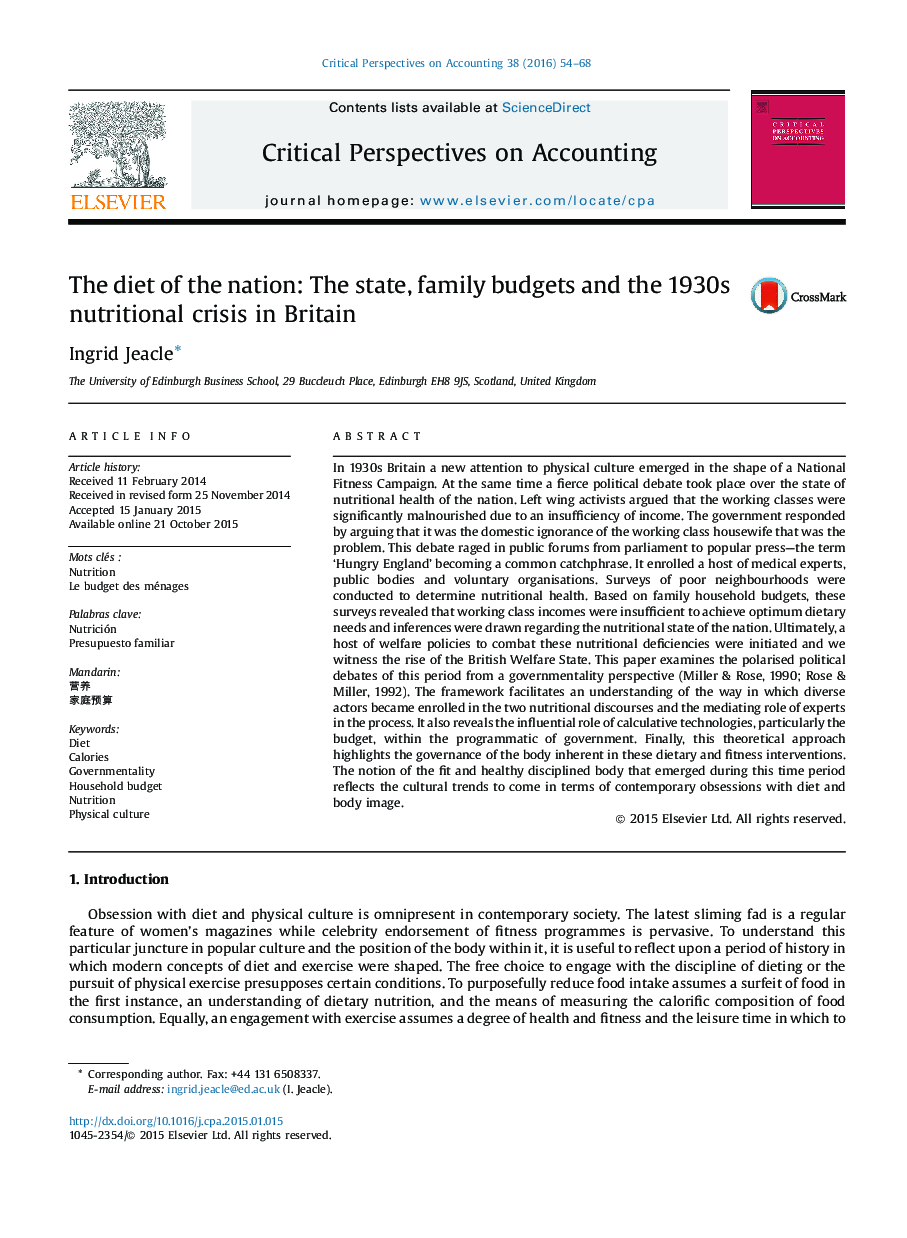| کد مقاله | کد نشریه | سال انتشار | مقاله انگلیسی | نسخه تمام متن |
|---|---|---|---|---|
| 7412190 | 1481697 | 2016 | 15 صفحه PDF | دانلود رایگان |
عنوان انگلیسی مقاله ISI
The diet of the nation: The state, family budgets and the 1930s nutritional crisis in Britain
ترجمه فارسی عنوان
رژیم غذایی ملت: دولت، بودجه خانواده و بحران تغذیه سال 1930 در بریتانیا
دانلود مقاله + سفارش ترجمه
دانلود مقاله ISI انگلیسی
رایگان برای ایرانیان
کلمات کلیدی
ترجمه چکیده
در دهه 1930 بریتانیا توجه جدیدی به فرهنگ جسمانی در قالب یک کمپین ملی تناسب اندام ظاهر شد. در عین حال بحث جدی سیاسی در مورد وضعیت سلامت تغذیه ای ملت صورت گرفت. فعالان چپ برهان معتقد بودند که طبقات کارگر به علت کمبود درآمد به طور قابل ملاحظه ای سوء تغذیه می شوند. دولت ادعا کرد که این ناخوشایند داخلی خانم کارگر طبقه کارگر بود که مشکل بود. این بحث در پارلمان عمومی از مجلس به مطبوعات پرطرفدار ختم شد - اصطلاح "انگلیس گرسنگی" تبدیل به یک کلمه کلیدی مشترک شد. این یک میزبان از کارشناسان پزشکی، سازمان های دولتی و سازمان های داوطلبانه را ثبت نمود. برای تعیین سلامت تغذیه ای، محله های فقیرنشین مورد بررسی قرار گرفتند. بر اساس بودجه خانوار خانواده، این نظرسنجی ها نشان داد که درآمد های طبقه کارگر برای دستیابی به نیازهای غذایی مطلوب کافی نبود و نتیجه گیری های مربوط به وضعیت تغذیه ای ملت صورت گرفت. در نهایت، تعدادی از سیاست های رفاه برای مقابله با این کمبود های تغذیه ای آغاز شد و شاهد افزایش سطح بریتانیا بودیم. این مقاله، بحث های سیاسی قطبش یافته در این دوره را از دیدگاه دولتیتی بررسی می کند (میلر و رز، 1990؛ رز و میلر، 1992). این چارچوب، درک روشهایی را که در آن دو بازیگر گوناگون در دو گفتمان تغذیه و نقش میانجی کارشناسان در این پروسه ثبت نام کرده، تسهیل می کند. همچنین نقش تأثیرگذار فن آوری های محاسباتی، به ویژه بودجه، را در برنامه دولتی نشان می دهد. در نهایت این رویکرد نظری حاکمیت بدن ذاتی این مداخلات غذایی و تناسب اندام را برجسته می کند. مفهوم تناسب اندام بدن و رشته ای که در طول این دوره زمانی ظهور یافت، نشان دهنده گرایش های فرهنگی است که از لحاظ وسواس های معاصر با رژیم غذایی و تصویر بدن مطرح می شود.
موضوعات مرتبط
علوم انسانی و اجتماعی
مدیریت، کسب و کار و حسابداری
حسابداری
چکیده انگلیسی
In 1930s Britain a new attention to physical culture emerged in the shape of a National Fitness Campaign. At the same time a fierce political debate took place over the state of nutritional health of the nation. Left wing activists argued that the working classes were significantly malnourished due to an insufficiency of income. The government responded by arguing that it was the domestic ignorance of the working class housewife that was the problem. This debate raged in public forums from parliament to popular press-the term 'Hungry England' becoming a common catchphrase. It enrolled a host of medical experts, public bodies and voluntary organisations. Surveys of poor neighbourhoods were conducted to determine nutritional health. Based on family household budgets, these surveys revealed that working class incomes were insufficient to achieve optimum dietary needs and inferences were drawn regarding the nutritional state of the nation. Ultimately, a host of welfare policies to combat these nutritional deficiencies were initiated and we witness the rise of the British Welfare State. This paper examines the polarised political debates of this period from a governmentality perspective (Miller & Rose, 1990; Rose & Miller, 1992). The framework facilitates an understanding of the way in which diverse actors became enrolled in the two nutritional discourses and the mediating role of experts in the process. It also reveals the influential role of calculative technologies, particularly the budget, within the programmatic of government. Finally, this theoretical approach highlights the governance of the body inherent in these dietary and fitness interventions. The notion of the fit and healthy disciplined body that emerged during this time period reflects the cultural trends to come in terms of contemporary obsessions with diet and body image.
ناشر
Database: Elsevier - ScienceDirect (ساینس دایرکت)
Journal: Critical Perspectives on Accounting - Volume 38, July 2016, Pages 54-68
Journal: Critical Perspectives on Accounting - Volume 38, July 2016, Pages 54-68
نویسندگان
Ingrid Jeacle,
